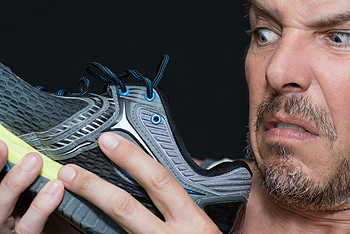
Drexel Hill (484) 521-0233
West Chester (610) 436-5883

Drexel Hill (484) 521-0233
West Chester (610) 436-5883
 Research has indicated the connection between increased body mass index, which is also referred to as BMI, and specific foot pain. When obesity is a factor, the feet may undergo pain, which may be a result of the additional weight the feet must endure. Some of these conditions may include plantar fasciitis, flat feet, and tendinitis, all of which may produce severe pain and discomfort. Clinical studies have indicated that three pounds of force the foot endures, while walking for every pound of body weight, may be the reason for the majority of foot pain. If children are obese, the ability to exercise may be compromised, which may make it more difficult to lose the additional weight. There may be several reasons for people to experience obesity, including genetic factors, a lack of knowledge of how the body is affected by food, and not burning calories through proper exercise. If you are affected by obesity, it’s advised to schedule a consultation with a podiatrist for frequent and thorough examinations of your feet.
Research has indicated the connection between increased body mass index, which is also referred to as BMI, and specific foot pain. When obesity is a factor, the feet may undergo pain, which may be a result of the additional weight the feet must endure. Some of these conditions may include plantar fasciitis, flat feet, and tendinitis, all of which may produce severe pain and discomfort. Clinical studies have indicated that three pounds of force the foot endures, while walking for every pound of body weight, may be the reason for the majority of foot pain. If children are obese, the ability to exercise may be compromised, which may make it more difficult to lose the additional weight. There may be several reasons for people to experience obesity, including genetic factors, a lack of knowledge of how the body is affected by food, and not burning calories through proper exercise. If you are affected by obesity, it’s advised to schedule a consultation with a podiatrist for frequent and thorough examinations of your feet.
The more you weigh, the harder your feet must work to support your body. If you’re an obese individual and are concerned about your feet, contact the podiatrists from Dr. Siegerman & Associates. Our doctors can provide the care you need to keep you pain-free and on your feet.
Obesity and Your Feet
People who are overweight are putting more pressure on their ankles, knees, and hips as well as their feet. This unfortunately can lead to variety of different issues.
Problems & Complications Stemming from Obesity
If you have any questions, please feel free to contact one of our offices located in Drexel Hill and West Chester, PA . We offer the newest diagnostic and treatment technologies for all your foot care needs.
 If you have young children, you should be aware of the different foot problems and abnormalities they may encounter throughout development. Some of these common conditions include in-toeing, flat feet, out-toeing, and tiptoe walking. In-toeing and out-toeing are conditions in which a child’s foot turns inward or outward, respectively. However, these conditions tend to correct themselves when your child approaches the ages of 8 or 9. Tiptoe walking is common in children aged 3 and under, and it involves the child walking solely on their tiptoes. Nevertheless, children’s feet tend to grow rapidly before the age of 5. Consequently, it is important that you give your child proper fitting footwear to promote healthy feet development. If you have concerns about the development of your child’s feet, you may find it helpful to speak with a podiatrist.
If you have young children, you should be aware of the different foot problems and abnormalities they may encounter throughout development. Some of these common conditions include in-toeing, flat feet, out-toeing, and tiptoe walking. In-toeing and out-toeing are conditions in which a child’s foot turns inward or outward, respectively. However, these conditions tend to correct themselves when your child approaches the ages of 8 or 9. Tiptoe walking is common in children aged 3 and under, and it involves the child walking solely on their tiptoes. Nevertheless, children’s feet tend to grow rapidly before the age of 5. Consequently, it is important that you give your child proper fitting footwear to promote healthy feet development. If you have concerns about the development of your child’s feet, you may find it helpful to speak with a podiatrist.
The health of a child’s feet is vital to their overall well-being. If you have any questions regarding foot health, contact the podiatrists of Dr. Siegerman & Associates. Our doctors can provide the care you need to keep you pain-free and on your feet.
Tips for Keeping Children's Feet Healthy
If you have any questions, please feel free to contact one of our offices located in Drexel Hill and West Chester, PA . We offer the newest diagnostic and treatment technologies for all your foot care needs.
 The human body produces sweat as a reaction to an increase in temperature. Since we are warm-blooded creatures, we excrete water through our pores to avoid overheating. However, it is possible for the body to produce more sweat than what is necessary; this condition is called hyperhidrosis. Hyperhidrosis may be caused by thyroid problems, hormonal fluctuation, anxiety, or medical conditions. One of the tell-tale signs of the condition is that it causes the individual to sweat regardless of the environment they are in. Sweat is meant to be a reactive condition, meaning that it occurs as a result of heat. When people have hyperhidrosis, they produce sweat without regard to the temperature. Additionally, it is common for people with the condition to only sweat in certain areas, such as the feet. If you are dealing with sweaty feet and are looking to find a solution, you should contact your podiatrist right away.
The human body produces sweat as a reaction to an increase in temperature. Since we are warm-blooded creatures, we excrete water through our pores to avoid overheating. However, it is possible for the body to produce more sweat than what is necessary; this condition is called hyperhidrosis. Hyperhidrosis may be caused by thyroid problems, hormonal fluctuation, anxiety, or medical conditions. One of the tell-tale signs of the condition is that it causes the individual to sweat regardless of the environment they are in. Sweat is meant to be a reactive condition, meaning that it occurs as a result of heat. When people have hyperhidrosis, they produce sweat without regard to the temperature. Additionally, it is common for people with the condition to only sweat in certain areas, such as the feet. If you are dealing with sweaty feet and are looking to find a solution, you should contact your podiatrist right away.
If you are suffering from hyperhidrosis contact the podiatrists of Dr. Siegerman & Associates. Our doctors can provide the care you need to attend to all of your foot and ankle needs.
Hyperhidrosis of the Feet
Hyperhidrosis is a rare disorder that can cause people to have excessive sweating of their feet. This can usually occur all on its own without rigorous activity involved. People who suffer from hyperhidrosis may also experience sweaty palms.
Although it is said that sweating is a healthy process meant to cool down the body temperature and to maintain a proper internal temperature, hyperhidrosis may prove to be a huge hindrance on a person’s everyday life.
Plantar hyperhidrosis is considered to be the main form of hyperhidrosis. Secondary hyperhidrosis can refer to sweating that occurs in areas other than the feet or hands and armpits. Often this may be a sign of it being related to another medical condition such as menopause, hyperthyroidism and even Parkinson’s disease.
In order to alleviate this condition, it is important to see your doctor so that they may prescribe the necessary medications so that you can begin to live a normal life again. If this is left untreated, it is said that it will persist throughout an individual’s life.
A last resort approach would be surgery, but it is best to speak with your doctor to find out what may be the best treatment for you.
If you have any questions please feel free to contact one of our offices located in Drexel Hill and West Chester, PA . We offer the newest diagnostic and treatment technologies for all your foot and ankle needs.
 If you choose to stand on your feet for the majority of the day, you may be susceptible to a skin condition that is known as cracked heels. This may typically occur as a result of the increased pressure the heels must endure, and may often produce considerable discomfort and pain. Research has shown there may be additional causes of cracked heels, including eczema, fungus conditions such as athlete’s foot, or a sunburn where the bottom of the feet are affected. In severely cracked heels, fissures may develop, which may be a gateway for germs to enter the body, possibly leading to infections. Patients may find moderate relief in eliminating the dry skin by utilizing a good moisturizer and spending less time standing on their feet. If athletes foot is the culprit, it may be treated by using an antifungal spray on your feet. If you experience cracked heels and it is affecting your daily activities, please consult with a podiatrist for information about what treatment options are best for you.
If you choose to stand on your feet for the majority of the day, you may be susceptible to a skin condition that is known as cracked heels. This may typically occur as a result of the increased pressure the heels must endure, and may often produce considerable discomfort and pain. Research has shown there may be additional causes of cracked heels, including eczema, fungus conditions such as athlete’s foot, or a sunburn where the bottom of the feet are affected. In severely cracked heels, fissures may develop, which may be a gateway for germs to enter the body, possibly leading to infections. Patients may find moderate relief in eliminating the dry skin by utilizing a good moisturizer and spending less time standing on their feet. If athletes foot is the culprit, it may be treated by using an antifungal spray on your feet. If you experience cracked heels and it is affecting your daily activities, please consult with a podiatrist for information about what treatment options are best for you.
If the skin on your feet starts to crack, you may want to see a podiatrist to find treatment. If you have any concerns, contact the podiatrists from Dr. Siegerman & Associates. Our doctors can provide the care you need to keep you pain-free and on your feet.
Cracked Heels
It is important to moisturize your cracked heels in order to prevent pain, bleeding, and infection. The reason cracked heels form is because the skin on the foot is too dry to support the immense pressure placed on them. When the foot expands, the dry skin on the foot begins to split.
Ways to Help Heal Them
Ways to Prevent Cracked Heels
If you are unsure how to proceed in treating cracked heels, seek guidance from a podiatrist. Your doctor will help you with any questions or information you may need.
If you have any questions, please feel free to contact one of our offices located in Drexel Hill and West Chester, PA . We offer the newest diagnostic and treatment technologies for all your foot care needs.
Request a free copy of
Laser Away Foot Pain!
today.
